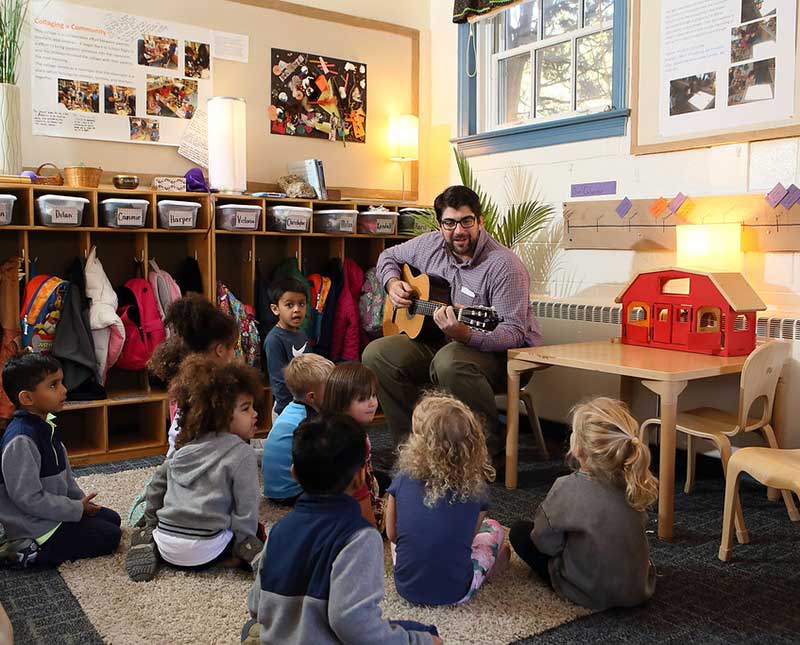Why Early Musical Education Can Unlock Developmental Potential

Beginning an Early Musical Education Before Age 9
Our preschool class at Moorestown Friends School begins and ends each day together with song. I have been teaching young children for nearly 14 years, and cannot remember a day which did not include music of some sort. Music is a language of joy, which brings people together, creating connections that are shared between communities and generations while also evoking deep personal feelings and emotions.
While music plays a part in the lives of all people – adults and children alike – there are developmental reasons for early musical education. Joanna Stamper, our Lower School music teacher, shared with me that each human is born with an innate amount of musical aptitude, which can increase or decrease based on the quality of early musical education experiences, and then begins to standardize by the age of nine. Simply put, as an adult you might be able to learn what keys to press to play a chord on the piano, but no matter how much technical expertise you learn, you will only be able to utilize the pitch and rhythm discrimination that you developed as a child. I find this fascinating, and a reinforcement of the importance of music in the lives of young children.
Early Musical Education and the Academic Connection
Music is strongly connected to language development. Tone and pitch, characteristics of music, are found in many languages around the world. In addition, early musical education can be a tool in the preschool classroom to teach language and articulation skills, supporting growth in rhyme, rhythm, patterning, alliteration, diction, and more. This academic connection should not be lost, especially because the incorporation of music and song into these lessons is done in a joyful and authentic way. Think to yourself: would you rather repeat a rhyme scheme back to a teacher, or engage in a rousing rendition of “Down by the Bay?” In my experience, the answer is obvious to children!
As I thought about writing this article, I found myself thinking about why I embrace music as a part of my life. I do not think it is coincidence that the line between my personal affinity to music and my priorities as a teacher are a bit blurred, for music brings people together, strengthens communities, and expands horizons. I was heartened to hear a story from a parent in my class recently. She told me that her children were at a dinner, and when the waiters started singing Leaving on a Jet Plane they jumped up, yelled “Mr. McVaugh’s song!” and sang along. This song, sung and loved in our classroom, became a connection for these children beyond the borders of our intimate community.
Introducing Complexity in Early Musical Education
It is important not to underestimate the ability children have to connect with and to appreciate high-quality music. Too often I see adults rely heavily on songs which are geared only for children and which are overly simplistic in their composition. I prefer to incorporate music with more complexity, which is pleasing to listen to for both adults and children. In doing so, intergenerational and interpersonal relationships are strengthened, love of music is fostered, and developmental potential is unlocked. If children are only exposed to songs which are written with limited musical complexity, the aforementioned musical aptitude which is innate to them will never be unlocked to its fullest potential. Also, good music is really fun to play!
I invite you to join us for an event called “Rhythm and Code,” led by our early childhood expert teachers Joanna Stamper and Lower School Coding Teacher Rachel Kaplan on Wednesday, May 30 at Moorestown Friends School. This event will explore the intersection between early musical education and early technological education, and give a short glimpse into the ways that each of these languages intersect with the lives of our students. Please click here to RSVP to this free event.
Beginnings at MFS is the Moorestown Friends School Early Childhood Program (Preschool, Prekindergarten, and Kindergarten). The Beginnings Blog is intended as a helpful tool for parents and guardians of young children, examining important ways in which children find meaning, in their lives and in their education.
Author Garrett McVaugh is the Beginnings at MFS Half-Day Preschool Teacher. Along with his Teaching Assistant Beth Mutch, he guides some of the youngest MFS students through their first year of school. A graduate of Haverford College, Garrett has been an early childhood educator for over a decade. Prior to MFS, he was a teacher at Preschool of the Arts in Madison, WI. Prior to living in Wisconsin, Garrett spent eight years teaching at St. John’s Episcopal Preschool in Washington, DC.
Schedule a Visit with Us
Learn more by a visit in person and meet with one of our excellent Early Childhood Program teachers.
